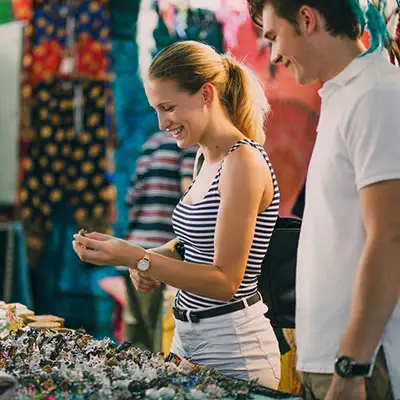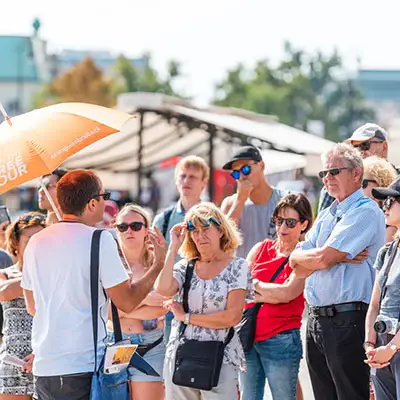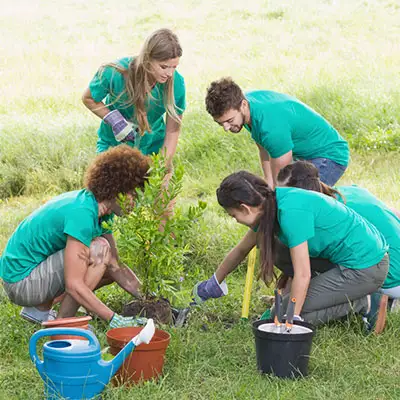Today’s tourists must actively choose whether or not to be ethical travelers.
All you want is to go to Mexico, drink a margarita, and get a tan? You can do that. But on some level, your trip will still have political, environmental, and cultural effects. The key is to make sure your quest for a suntan has a powerfully positive influence.
In less time than it takes to drink a margarita, I'll give you eight tips for how to become ethical travelers.
Economic and Ethical Implications of Tourism
Tourism doesn’t happen in a bubble. If it did, what would be the point? Our actions impact the places we visit in so many ways.
Economically, tourism can showcase disparities. But as in industry, it can also fuel economies throughout the world.
Scholars say that when tourism contributes to 5% or more of a national economy, it is considered to be a highly significant component of the country’s economy. Of the 172 countries where statistics are available, tourism is a highly significant component of 61 of those economies.
As we said in our guide to traveling sustainably, almost 7% of jobs globally are in the tourism industry. These jobs show up almost everywhere, from the most developed cities and countries to areas that are just starting to welcome visitors more regularly. This employment is vital, regardless of the destination.
Some also argue that tourism can be a driving force for democracy. Travel requires political freedom, and the “global trend towards democracy and openness will ... contribute to a burgeoning global tourism industry,” writes Monica DeHart in her book “Migration and Tourism: People on the Move.”
But before you buy travel insurance and help the world by taking a trip to Fiji, know that tourism isn't without its dark side.
The Dark Side of Tourism
Even for ethical travelers, too much of a good thing is a real concern. As DeHart, a professor of anthropology at the University of Puget Sound, explains, “The very things that attract tourists in the first place, be it mountains, beaches, or rainforests, often become threatened as visitors quickly exceed the destination’s carrying capacity.”
We’ve come to know this as overtourism. Increasingly, some destinations are actually trying to discourage tourists from visiting in an effort to preserve their local culture and environment.
Amsterdam Schiphol Airport has been trying to reduce capacity for some time now to combat noise pollution. Peru’s Inca Trail limits hiking permits to about 500 per day. Venice started charging a tourist entry fee in 2024. Alaska is limiting the number of cruise ships that can dock in Juneau each day.
While the tourism dollars are important, and some of those dollars go toward financing the protection and preservation of those sites, it’s a delicate balance. As a society, we’ve yet to fully figure out where that balance lies.
There are also cultural and environmental implications of travel that aren’t all great. Tourism can commercialize a culture, which strips the original meaning of traditions, festivals, and customs as locals cave to commercial pressures and incentives to produce their culture for profit.
The nature of modern travel relies on an infrastructure, which contributes considerably to pollution from greenhouse gas emissions. Elisabeth Rosenthal wrote for the New York Times, “air travel is [the] most serious environmental sin.” One flight from NYC to Europe produces two to three tons of carbon dioxide per passenger.
It’s a major reason that the airlines are trying to develop cleaner fuel, cruise lines are looking for energy alternatives, and more people are opting for train travel. The travel itch is undeniable. The question now becomes, how do I travel responsibly?
8 Strategies for More Responsible Travel
1. Act in the way you would like visitors to your own country to act.
Would it be a little off putting if a Cambodian man with a camera barged into your yard and snapped a picture of you gardening? People from another country are not tourist attractions; they are people who happen to be from another country. Interact with them, feel out the situation, and ask permission before snapping a photo.
Once, as a little social experiment, I pretended to take photos of people on the streets of New York. I had just returned from Vietnam where I was put off by how many tourists snapped photos of the locals at any opportunity.
While the Vietnamese gracefully put their hand up when they didn't want pictures, Americans were far less receptive when the lens focused on them in their country.
We can sum this one up as “Follow the golden rule.” Treat others how you would like to be treated.
2. Learn about the social practices, customs, language, and culture of your destination.
I'm not asking you to enroll in a college class, but it certainly is worthwhile to Google a destination before you travel there. It’s as simple as searching “10 things every traveler in [name of country] should know.”
This is just a start to your knowledge. The best way to add to it is to ask the locals questions about their home country.
3. Support the local economy whenever possible.
Do you want the money you spend abroad to be given to a large transnational corporation? Or do you want it to go to a local family to pay for their children’s schooling?
I’d venture that most travelers support the latter.
Critics of international travel point out that there are many revenue leakages in the global tourist system, which result in profits going not to local people, but to foreign international corporations. While tourism jobs are often low-wage, sometimes dangerous, working-class jobs with little hope for advancement, doing your part to keep money in the country is a good step.
When buying souvenirs, finding lodging, eating dinner, and scheduling tours, ask questions and find out where the money goes. Whenever possible, give your business to establishments owned by locals.
4. Be an ecotourist.
Do your research on protected areas. If tourism is destroying the local environment, find a different place to plan a trip. Take the greenest travel options available to you in your price range.
Find out which airlines have the strongest commitment to reducing carbon emissions and reward them by patronizing them. Try slow travel. Make simple swaps in what you pack and whether you buy new gear for every trip, upcycle, or simply stick with what you already have.
5. Leave your books with the locals. Bring back local books.
In many countries, the books we have in any Barnes & Noble simply cannot be found. Since people around the world seem to be in a race to learn English, you can really brighten someone's life by leaving with them a book in English. That “Pulp Fiction” paperback might just become someone's new most valued possession.
Shop for books written by local authors when you travel. You’ll be supporting their art and, when you bring those books home, introducing diverse voices to your own personal library and bookish friends.
6. Learn the language by conversing with a local.
Why pay an instructor to teach you a new language when you can converse with everyday people on park benches or on public transportation?
Learning the local language — even just a few phrases — is a sign of respect. And when you learn by talking with a local, everyone gets something out of it. More than likely, you’ll end up learning a lot more than just a new language.
7. Volunteer with a charity that makes real sustainable changes.
There’s an entire subsection of travel called voluntourism. You get an amazing experience abroad, interacting with locals and giving back to your host community, and your destination benefits from your hard work.
Volunteer trips can last several years, like in the Peace Corps, or they can be as short as a week. It’s not about the length of time you spend on your trip, but the quality of the time you put into it.
8. Visit as a guest in someone else’s home.
Whenever you are a guest in someone else’s country, be an ambassador for your own culture. Be there to listen and learn, and in appropriate circumstances, share about your own home. There are differences in cultures, but people everywhere share the same baffling, yet wonderful human nature.
Some of the best ways to have these meaningful conversations is to do a homestay. Spend time in their home and get to know them on a deeper level.
Don’t just barge in on someone, though. Especially when you’re new to a country, it’s best to arrange a stay through a company that organizes these exchanges. If you happen to already know someone at your destination and they invite you home for the weekend, take advantage of this rare opportunity.
Just remember to be respectful of other people’s privacy. This will go a long way toward establishing a good ambassador relationship. After all, you are representing your home country and its people, too.
Ethical Travelers Buy Travel Insurance
Buying travel insurance has lots of advantages. It can protect your own money, belongings, and health. But a little-known bonus is that it can also protect your destination.
Imagine you’re traveling in a remote area overseas when you step awkwardly on uneven ground. There’s a horrifying crunch sound. Something in your leg has definitely broken. With travel insurance, Seven Corners can help you find medical care. If there isn’t a hospital or doctor that can provide necessary treatment, we can transport you somewhere that can. And your travel insurance can pay for it.
Without travel insurance, not only are your health and finances at risk, but you might be putting extra stress on your host’s resources. The area might not have sufficient medical supplies to treat visitors.
If there’s a natural disaster and you need to cancel or interrupt your trip, you can do that and still be reimbursed if you have travel insurance. You don’t want to end up in a country where food, water, and medical supplies are needed by locals while they recover from a disaster.
Make the smart decision to protect yourself — and your destination — with travel insurance. Get a quick quote at SevenCorners.com.




